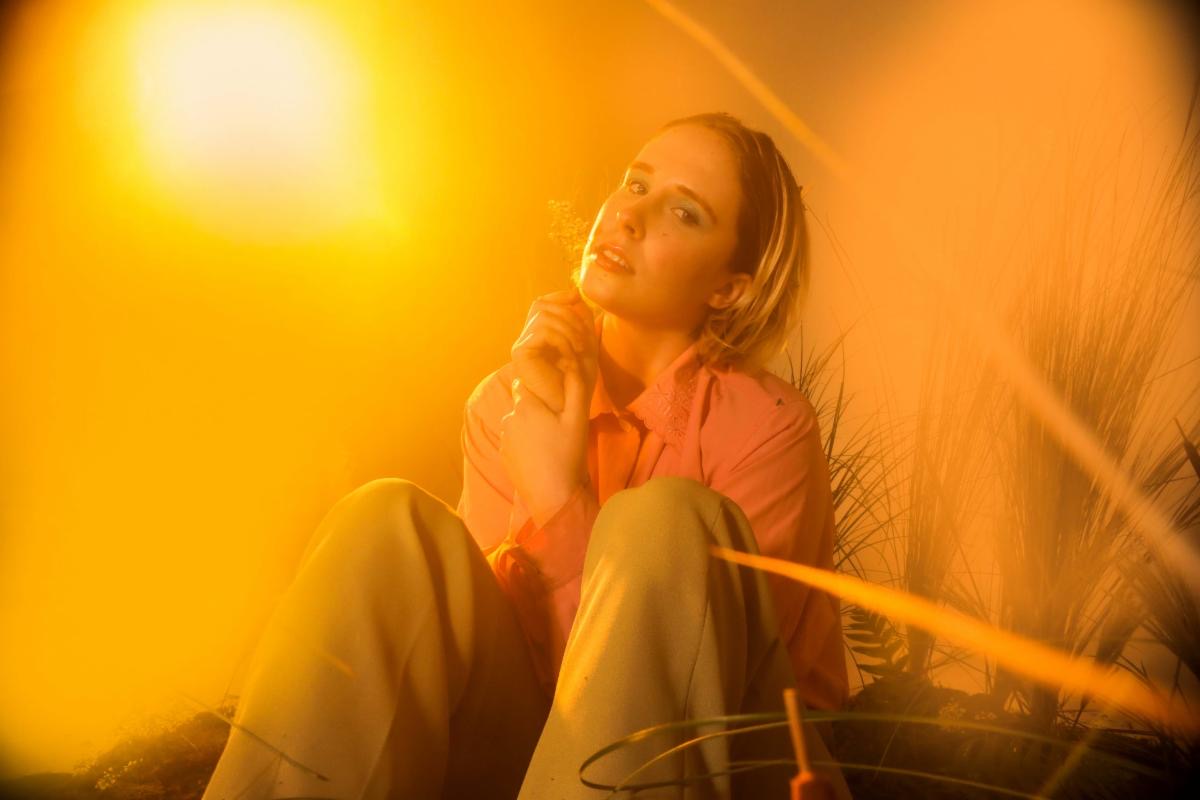You might have thought you’d stumbled upon a birthday party on your way to the bathroom at a Brooklyn gay bar last Friday, down the stairs of the Branded Saloon and into a space no bigger than a living room, where an intimate handful of friends and strangers danced with pure joy as the diva of the night sang infectious bops on a mini stage. Nina Grollman, aka Softee, garnered that kind of cozy, devoted enthusiasm in the crowd. Forget the daily grind, the vibe dictated; life is about sparkling and being with friends and having a fabulous time.
Softee, a local genderqueer popstar, seems to be a natural “birthday girl,” one who takes to the center of attention with ease. Before devoting herself fully to music, Grollman was a Minnesota theater kid who made it to Broadway as one of literature’s most beloved characters, Scout Finch, in a stage adaptation of To Kill a Mockingbird. Add a set of pipes to her skills in performance and charisma and you get a local pop diva at the beginning of her career. So far she’s enjoyed success with a hit single, “Oh No,” that has over two million Spotify plays. As in many of her other songs, in it she sings blissfully about falling for someone totally irresistible.
Despite the popularity of “Oh No,” part of Softee’s appeal is her underground sound, a sense of the homemade in her songs. Although there are obvious references to the glossy ‘80s, Softee imbues sincerity and a refreshing DIY clunkiness down to the seams of her glitzy, synth-driven ballads. Her playfulness makes her a bedroom pop artist, the queen of Garageband rather than the studio. She once even turned “Blue” by Eiffel 65 into a Gregorian chant-trap remix with her sister, for kicks. Grollman’s voice turns her songs into the work of a professional. Imagine the girlish range of Empress Of with the stylishness of Hiatus Kaiyote’s Nai Palm. It’s exciting to see vocal skill make a comeback in a world of Taylor Swifts and Maggie Rogers’s. Being “extra” with the voice feels tied to Y2K revival and 1980s kitsch. The whole Softee package recalls the Petra Collins aesthetic: haze, tinsel, bisexual lighting, everything haloed in a vintage glow.
The concert, whether intended or not, leaned into the kitsch. It wasn’t even so much a concert as it was a party with a brief Softee interlude, Softee karaoke, performed by Softee. On a small stage raised by a single step, she belted out just four songs with only a backing track accompanying her. One might feel cheated by this setup any other time but in Softee’s case it’s completely appropriate. Karaoke is right in line with her DIY sensibilities, not to mention that her voice is the main spectacle. The first song was fan fave “Molly,” charming with clever wordplay in the refrain: “Is it the molly, or am I really falling?” Does “molly” refer to the drug or could it be a girl? If drug, we are in a world where drugs are all fun and sweetness and the pill goes down smoothly. I almost prefer her live vocals here for the slight edge they offer the song, even as she hit every note.
Her next song, “Red Light Green Light” was the highlight of the evening, inspiring the party’s theme and business casual dress code in the first place; in the music video, Softee paces around Manhattan, hair slicked back, wearing an oversized pinstripe suit as her lyrics bemoan capitalism. This look has become something of a signature for her, and surely enough she came to the show dressed in white button-down stuffed into big pants. Corporate chic has been around for a while in ironic forms (see music videos by Michael Gray and Naomi Elizabeth) and unironic forms (see Zara’s whole catalogue), and the way Softee plays with the style is more in line with her androgynous identity. Instead of taking on the sexy, feminine version, secretary girl with lacy bra hiding just underneath a collared shirt, Softee appropriates the male counterpart—CEO in CEO outfit and a big wide tie whose opportunity for phallic symbol is not wasted in the music video. Watching her stomp around town in these clothes is like watching a five-year-old play dress-up out of her dad’s closet.
It’s hard not to associate her look with David Byrne and his giant grey suit. He didn’t mean to make a sociopolitical statement when he wore the suit in his early 1980s shows. According to interviews, Byrne just wanted his outfit to set the Talking Heads apart from other alt music scenes back then; plus, “I wanted my head to appear smaller” (from Stop Making Sense). Goofiness for the sake of goofiness made their shows a ridiculous joy to watch, Byrne’s tiny head poking out of a big boxy blazer, his body bobbing around when he danced. Still, retrospect makes the donning of the suit during the yuppie era look like satire. Who are the anonymous men walking around America’s financial districts, talking on cellular devices, holding very important briefcases full of very important things?
“Red Light Green Light” asks these questions more consciously. Softee levies a direct critique at those who wear the suits, mocking them, even while she has a blast playing the CEO role. In it she rides elevators, counts hundred dollar bills, fights losers, and parties in red-light clubs. Her silliness in the role implies that people like her do not get the opportunity to fill it. So “Red Light Green Light” claims: “You got money, will you lend me some? / You don’t earn it, let me get a crumb now. / Who’s to say I’m not like you? / If I had that motherfuckin’ trust fund.” Then, there’s the can of worms that is the song’s reference to a moment in Squid Game, a Netflix series which explores the horrors people will put themselves through when they are desperate for money. Ironically, the song’s sound is very “browsing the business chic section of an H&M,” which can undermine its message—or give it an extra layer. I’m not mad about this. If I heard “Red Light Green Light” while out shopping, I might start flipping through clothes-hangers to the beat.
After that, Softee sang two unreleased singles “Come Home,” and “Isn’t Enough,” for which she teased dates, and that was it—she stepped down from the stage and joined her friends. The DJs immediately queued Nelly Furtado, one of my favorite vocalists ever, and while I chatted with my neighbors and gathered my things I found myself grateful that skilled pop musicians are not extinct in 2023. And perhaps even rarer to hear someone actually rock at karaoke, even in New York City.
For more visit Road Trip Playlists.























